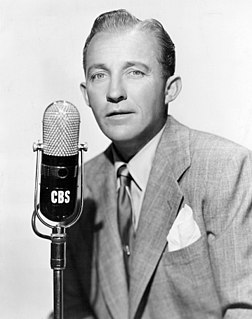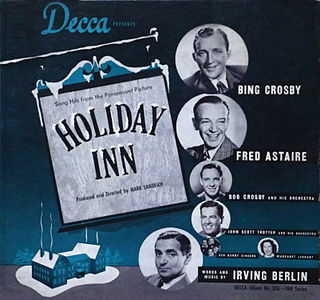
Song Hits from Holiday Inn is a studio album of phonograph records by Bing Crosby and Fred Astaire released in July 1942 featuring songs presented in the American musical film Holiday Inn. These are the longer studio recorded versions of the songs presented in the film. For the songs that were actually in the film, see Holiday Inn (soundtrack). This album is not only notable because it is one of the greatest works of the highly regarded songwriter Irving Berlin, but it is only Crosby's third studio album. This was also the first release of Crosby's signature song "White Christmas" on shellac disc record. The 1942 version would only be released only one more time, in Merry Christmas in 1945 before the song was re-recorded and the later version became the standard.
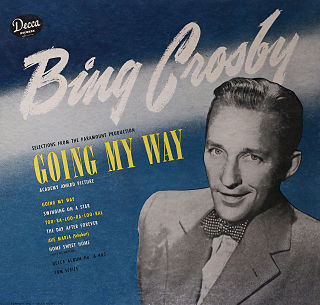
Selections from Going My Way is a studio album of phonograph records by Bing Crosby released in late 1945 featuring songs that were presented in the American musical comedy-drama film Going My Way. This was the first release of one of Crosby's best songs throughout his career, "Swinging on a Star", on shellac disc record.
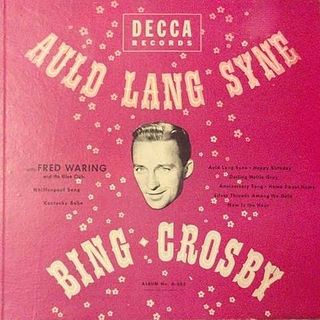
Auld Lang Syne is a compilation album of phonograph records by Bing Crosby released in 1948 featuring songs that were sung by Crosby and also by Fred Waring and his Glee Club. The songs were later presented in 33 1/3 rpm and 45 rpm sets, respectively. This set featured many of Bing's great hits such as: Silver Threads Among the Gold and Now Is the Hour.

Blue Skies is a studio album of phonograph records by Bing Crosby and Fred Astaire released in 1946 featuring songs that were presented in the American musical film Blue Skies. Like Song Hits from Holiday Inn, the entire 78 rpm album would be composed of Irving Berlin songs written specifically for the film. This was the first release of one of Astaire's greatest songs, "Puttin' On the Ritz", on shellac disc record.

St. Patrick's Day is a compilation album of phonograph records by Bing Crosby released in 1947 featuring songs with an Irish theme. This includes one of Crosby's most-beloved songs, "Too-Ra-Loo-Ra-Loo-Ral" which was number four on Billboard for 12 weeks, and topped the Australian charts for an entire month, on shellac disc record. This version, the 1945 re-recording, was released earlier in another Crosby album, Selections from Going My Way.

Feels Good, Feels Right is a 1976 vinyl album recorded by Bing Crosby for Decca Records during four morning sessions in 1976 at Decca Studio No.3, Broadhurst Gardens, London. He was accompanied by Alan Cohen and his Orchestra. Cohen also did all the orchestral arrangements.

South Pacific is a compilation album of phonograph records by Bing Crosby, Danny Kaye, Ella Fitzgerald and Evelyn Knight released in 1949 featuring songs from the Rodgers and Hammerstein musical, South Pacific. The album was placed 8th in Billboard's chart of best-selling popular record albums in July 1949.

A Connecticut Yankee in King Arthur's Court is a studio album of phonograph records by Bing Crosby and other stars of the Paramount movie A Connecticut Yankee in King Arthur's Court featuring songs from the film. All of the songs were written by Jimmy Van Heusen and Johnny Burke.

Selections from The Bells of St. Mary's is a studio album of phonograph records by Bing Crosby released in 1946 featuring songs that were presented in the American musical comedy-drama film The Bells of St. Mary's.
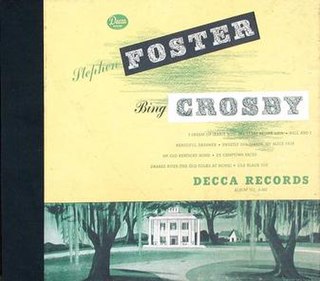
Bing Crosby – Stephen Foster is a compilation album of phonograph records by Bing Crosby of songs by Stephen Foster released in 1946.

Bing Crosby – Jerome Kern is a compilation album of phonograph records by Bing Crosby of songs written by Jerome Kern.

Bing Crosby – Victor Herbert is a compilation album of phonograph records by Bing Crosby and Frances Langford of songs written by Victor Herbert.

The Small One is a studio album of Deccalite phonograph records by Bing Crosby of a Charles Tazewell story. It was produced and directed by Paramount Pictures producer Robert Welch with musical accompaniment from Victor Young and His Orchestra.

St. Valentine's Day is a Decca Records compilation album of recordings by Bing Crosby.

Christmas Greetings is a studio album of phonograph records by Bing Crosby released in 1949 featuring popular Christmas songs.

Songs from Mr. Music is a Decca Records studio 78rpm album of phonograph records by Bing Crosby, The Andrews Sisters and Dorothy Kirsten of songs from the film Mr. Music, catalog number A-790.

Bing Crosby – Way Back Home is a Decca Records compilation 78rpm album of phonograph records by Bing Crosby featuring sentimental and homely songs.

Beloved Hymns is a studio album by Bing Crosby released in 1951 featuring eight hymns recorded with the Ken Darby Choir and organ accompaniment on May 6, 1949.

